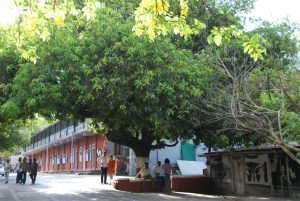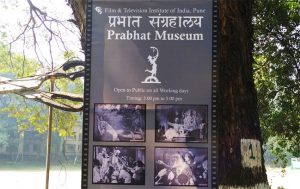FTII: A Wonderland for Film and Television Students
First set up in 1960, the FTII has continued to instil a legacy of visual culture in thousands of its students.
The Film and Television Institute of India (FTII) is one of India’s premier institutions to acquire knowledge about cinema and visual culture and has given the country its most celebrated actors, directors and filmmakers while continuing to instil a legacy of cinema appreciation among thousands of its students.
about cinema and visual culture and has given the country its most celebrated actors, directors and filmmakers while continuing to instil a legacy of cinema appreciation among thousands of its students.
The FTII, initially known as the ‘Film Institute of India’, falls under the purview of the Union Ministry of Information and Broadcasting and is based in Pune, Maharashtra.
The FTII was first set up in 1960 by the GoI in the premises of the erstwhile Prabhat Studios in Pune, once a pioneer in film production. The old heritage structures of Prabhat Studios, which produced films like Shejari, Sant Dyaneshwar and Sairandhri from 1933 onwards, are now used by FTII students to work and shoot films. It is known to have been the biggest film studio in Asia during its peak and produced 45 films in both Marathi and Hindi languages.
In 1971, FTII came to be known as the ‘Film and Television Institute of India’ (FTII) and soon started in-service training programs for Doordarshan, India’s public broadcaster. The Television Training wing, which was earlier functioning in New Delhi, shifted to Pune in 1974.
Also Read : Lust Stories establishes future of streaming in India
Today, the institution serves as a centre for excellence in audio-visual media and is recognized as one of the best film institutes in India. Its alumni work in countries spattered across the globe, and in several Indian states. FTII’s alumni have gained popularity and have earned various laurels as accomplished technicians and superstars. The alumni have also won popular awards, including the ‘National Film Awards’ to ‘Oscars’, the ‘Dada Saheb Phalke award’ to the prestigious ‘Padma Awards’. A few names include celebrated actors Mukesh Khanna, Naseeruddin Shah, Smita Patil, Shabana Azmi, Om Puri, and directors Adoor Gopalakrishnan, Ritwik Ghatak, Mani Kaul, Girish Kasaravali, David Dhawan and Vidhu Vinod Chopra, among various others.
The institution is currently chaired by veteran actor and director Shekhar Kapur, who took command in 2020. In his message to the students as the Chairman, Mr Kapur writes:
“How do you teach filmmaking or its component parts? Be it directing, acting, sound, writing?
The answer is simple. You don’t teach. You simply provoke the artist in the student. You simply encourage the students to explore the artist in themselves. And then allow them to learn how to use the technology of their chosen art, the camera lens, the edit machine, the pen, the body, the voice, the soul, to express the world through their own lens.
There is no teaching, but there is co-learning between the teacher and the taught. In a way, to relearn your creative expression also involves a process of unlearning.”
Academics and Admissions
The FTII offers eleven full-time courses in several disciplines of film and television, as well as a host of short-term courses, which are held on-campus in Pune and off-campus across centres located all around India. The courses are divided into two wings, Film Wing and Television Wing, and are as follows:
Courses in Film Wing
1. Direction and Screenplay Writing
2. Cinematography
3. Editing
4. Sound Recording and Sound Design
5. Art Direction and Production Design
6. Screen Acting
7. Screen Writing (Film, TV and Web Series)
Courses in TV Wing
1. Direction
2. Electronic Cinematography
3. Video Editing
4. Sound Recording and Television Engineering
These courses function as three, two, or one-year post-graduate diploma courses. The eligibility criteria differ for all courses, but generally requires a bachelor’s degree. Further details of the criteria can be accessed here.
The admission process consists of the nationally administered Joint Entrance Test (JET), and subsequent rounds of orientation and interviews. The students are selected on the basis of their JET scores, and performance in the orientation & interviews. On the basis of performance in JET, the list of candidates shortlisted for the next level of selection is made available on the website of the institute, which then sends interview letters to the shortlisted candidates directly.
The institute also offers a number of short-term courses, which are one to three months long in duration. A few scheduled to commence at the end of July include Foundation Course in Digital Film Production, Basic Course in Writing Script for Films and Web Series, Basic Course in Creationd Characters for Film, TV, and Web Shows, and Foundation Course in Still Photography. These courses are currently being conducted online due to the Covid-19 pandemic, and function on a first-come-first-serve basis. Further details can be accessed here.
Also Read : Ekdin Pratidin: Is the Working Woman Truly Liberated?
Campus Life
 At the FTII, the students undergo a deep learning experience about the features of film and television. FTII is well known for its film screenings, which offer students practical knowledge about understanding the art of visuals in a film.
At the FTII, the students undergo a deep learning experience about the features of film and television. FTII is well known for its film screenings, which offer students practical knowledge about understanding the art of visuals in a film.
As per the FTII, the daily screenings are a unique part of student life at the institute. A variety of classics and contemporary national and international films are screened every evening from Monday to Friday either at the FTII Main Theatre or at the National Film Archive of India. In addition, Saturday screenings celebrate popular Indian cinema; ensuring that students remain grounded in the prevalent practice of film-making in the country. The ‘Main theatre’ commonly known as ‘MT’ is equipped with 300 seats and has 35mm film projection as well as a digital screening facility.
The institute also provides hostel facilities for both male and female students, details of which can be accessed here.
The Outreach Department of the FTII collaborates with several film schools across the world, including France, Germany, Australia, China, and Malaysia, to facilitate a dynamic exchange of knowledge among students and faculties. Since its creation in 2012, the Outreach Department has entered into MoUs with the Griffith University of Queensland (Australia), Beijing Film Academy in China, and the International Film School of Germany, among others, for short term exchange programs.
“Students are encouraged to learn and exchange ideas thereby gaining knowledge in their respective specializations. Faculty members are also encouraged to enhance their abilities and enrich their knowledge in their subject domain. Sharing of the best practices between faculty members propels the teaching-learning process at the FTII. Providing impetus to events, organizing women-oriented forums, and providing student support are the other roles performed by the department,” the official website reads.
The institute also conducts regular student interactions with notable artists in the country. For instance, in the month of June, the students interacted with Boman Irani, Sriram Raghavan, Manoj Vajpayee, AR Rehman, and Raj Kumar Hirani, all acclaimed artists in the film industry.
Other notable alumni of the institute include Resul Pookutty, Jaya Bachan, Rasika Dugal, Balu Mahendra, Mithun Chakraborty, Rajkumar Rao, Shatrughan Sinha, Santhosh Sivan, Shaji N Karun and Sanjay Leela Bhansali.
